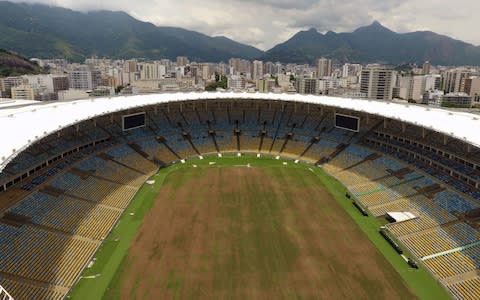Fifa talks a good game but its drive for sustainability highlights football's hypocrisy

The official Fifa website has an entire section devoted to sustainability. There, you will find a recent news stories headlined ‘Green certification for all 2018 World Cup stadiums’, while further down the page there is a document outlining ‘carbon offsetting projects for the 2018 Fifa World Cup’ and another scrupulously detailed file called ‘2018 Fifa World Cup: Greenhouse gas accounting report’.
That final document, published in 2016, contains projections for the amount of carbon dioxide to be produced by every aspect of this summer’s World Cup, from food and beverages to waste and ‘leased facilities’. Fifa also recently became the first sporting body to commit to a UN initiative which targets carbon neutrality by 2050. "In doing so, Fifa pledged to measure, reduce and compensate the greenhouse gas emissions related to the 2018 Fifa World Cup," a spokesperson said.
Clearly, football’s world governing body is aware of the need to adapt, to be more environmentally aware and to reduce its carbon footprint. Or, at least, that is the image it wants to portray.
Since the World Cup, however, there has been no confirmation that carbon emission targets were met. Fifa have also been criticised for misleading people over just how much work they are doing to become more green, an act known in environmental circles as ‘greenwashing’.
Critics claim Fifa’s attempts to offset the carbon dioxide production they cannot avoid - by, for example, funding carbon-cutting projects elsewhere - do not even come close to matching their significant footprint. Their 2018 World Cup carbon offsetting is alleged to amount to just 16 per cent of the event’s total predicted emissions.
Others also claim that many of the ‘green’ stadiums built for Russia 2018 destroyed vulnerable ecosystems, while there is reportedly no plan in place to avoid those vast structures becoming disused wastelands, like many of the stadiums from the 2014 World Cup in Brazil.

Qatar 2022 has ‘green’ stadiums but Fifa then opted to reject Morocco’s bid for 2026 even though their six new ‘green’ stadiums generate enough renewable electricity to power a town of 22,000 people for a year.
Back on the Fifa website, a couple of clicks away from the sustainability page you will find a list of their partners, which include Gazprom, the largest supplier of natural gas to Europe and the first company to start digging for oil in the Arctic Circle, airline Qatar Airways, car manufacturer Hyundai and China’s second-largest dairy company, Mengniu.
This is the cold hard reality of the world in which football operates. For all of the aims Fifa has to become carbon neutral and meticulously plan the footprint of their events, their actions suggest something rather different. In football, money talks.
“You can't on one hand claim to be a champion of sustainability and on the other take money from industries driving the climate crisis,” Jesse Bragg, spokesman for NGO Corporate Accountability, told Telegraph Sport. “That’s called greenwashing. It's akin to making commitments to public health while taking money from Big Tobacco — it just doesn't pass the smell test.”
This isn’t a problem limited to Fifa. Arsenal and Manchester City, two of the Premier League clubs that Telegraph Sport’s audit found are among those doing the most to reduce their impact on the environment, are sponsored by major airlines. Only three years ago Arsenal chose to fly for 14 minutes to Norwich for a Premier League match rather than take a two-hour train journey.
The following statement can also be found on Fifa’s website: "Fifa believes we all have a responsibility to protect, cherish and limit our impact on the environment.”
Words alone do not suffice. Football’s governing body needs to act, too.

